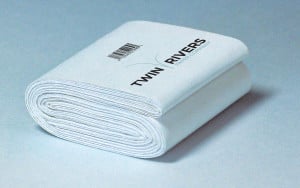
Twin Rivers Pharmopaque® Pharmaceutical Insert
Madawaska, ME (May 15, 2015)–
Ken Winterhalter, President of Twin Rivers Paper Company, submitted a letter to the FDA asking the agency to withdraw its proposed rule to eliminate the use of printed pharmaceutical inserts. The policy mandates the electronic distribution only of critical drug information targeted to pharmacists and healthcare workers.
May 14, 2015
Food and Drug Administration
Division of Dockets Management (HFA-305)
5630 Fishers Lane, Room 1061
Rockville, MD 20852
Re: Proposed Rule to Require the Electronic Distribution of Prescribing Information for Human Prescription Drugs, Including Biological Products [Docket No. FDA- 2007-N-0363]
Dear Sir or Madam:
It is my honor to represent the 1,100 men and women employed at the Twin Rivers Paper Company, where I serve as the President. We are one of the largest employers in Maine with over 588 full-time equivalent jobs, providing an average annual salary package valued in excess of $83,000 and an economic output of over $1 billion per year.
The FDA has chosen to address a fundamental policy question in health care around the role of digital records and the curation of medical information. While we recognize the initial attractiveness of a digitized system, the realities of communicating vital prescribing information within a digital-only regime require a coherent strategy to address the many unavoidable externalities. Furthermore, we seek to impress upon the FDA the availability of credible information that supports the conclusion that the large-scale elimination of printed prescribing information (PI) presents a number of potentially serious, if unintended, risks to the public health.
Printed PI is the most reliable modality for the secure delivery of critical information from the drug manufacturers to the end users, such as pharmacists, who then explain the information to the public. The FDA has failed to present valid scientific data that the paper system, alone or with an electronic redundancy, has failed the public health goals of the United States. Paper does not fail. The same, however, cannot be said for the Internet.
In fact, USA Today recently reported that our nation’s power grid is struck by a cyber or physical attack once every four days.[1] This fact is unsurprising, as stories about cyber-security breaches have become a daily event, from the attacks on Sony, Anthem Insurance and even government agencies. In fact, just last month, reports surfaced indicating that Russian hackers managed to breach the White House computer system. It is clear from these reports that no one—not even the White House—is protected from the threat of a cyber-attack.
In its report analyzing the impact of an exclusively e-labeling system for PI, the Government Accountability Office noted that there are “times when such technology is simply not available due to power outages or during the aftermath of natural disasters, such as Hurricanes Sandy and Katrina.” [2] While the FDA has determined that “the time is right” for a transition to an e-labeling system for PI, the agency appears indolent with regard to planning for the many contingencies that compromise access and reliability to advanced internet services.
Even in fair weather and blue skies, millions of people in the United States lack access to advanced internet. The Federal Communications Commission’s 2015 Broadband Progress Report found that 55 million Americans still lack access to advanced broadband Internet.[3] Families in rural areas and tribal areas are particularly vulnerable and their plight has not earned attention from the FDA as evidenced by this proposed rule. Another neglected voice is that of the pharmacist community.
In a study to assess pharmacist usage of printed PI, NERA Economic Consulting reported that pharmacists expressed that paper can more easily be shared between pharmacy staff, healthcare professionals and the patients themselves. Fifty-five percent (55%) of pharmacists indicated that they had provided the PI to patients.
The rule will also shift the burden of the costs associated with PI from the drug manufacturers, who can most afford it, to the healthcare providers such as community pharmacists, who can least afford it. By the FDA’s own estimations, the costs of implementing this rule could range from $47 to $89 million, threatening the survival of local independent pharmacies across the nation. If they are forced to close due to these new mandated costs, communities across the country will be affected. The negative impact of this rule is national in scope. Congress is accountable to the citizens at a national level and should therefore be the proper place for contemplating and planning for these various contingencies.
As you know, Congress has acted on behalf of the public interest in this matter. Report language in the Senate Ag, FDA Appropriations, just signed into law last December (FY 2015 Omnibus) clearly limits the FDA’s authority to act against the continued use of paper inserts. The report reads, in part: “Therefore, the Committee directs FDA to ensure that any proposed regulation regarding electronic inserts of drug labeling does not come in lieu of paper inserts.” Congress also indicated its intent last year when the Congress removed bill language supporting the FDA’s electronic labeling proposal before passing the Drug Quality and Security Act of 2014. Furthermore, 27 United States Senators came together in a bipartisan way to sign a letter to the FDA detailing their collective objection to the proposed rule.
Twin Rivers Paper Company joins the National Community Pharmacists Association, the Small Business Administration, 30 United States Senators; several Members of the House of Representatives and hundreds of other fellow citizens in urging the FDA to withdraw its proposed rule as soon as possible. The implications of changing national policy at this scale are too significant to cope with anywhere except in Congress. Any incremental benefit to be obtained by the implementation of this proposed rule can be fully realized in the current dual system where paper delivers for America.
Thank you for your consideration.
Sincerely,
Ken Winterhalter
President
[1] Bracing for a big power grid attack: ‘One is too many,’ USA Today. March 24, 2015.
[2] GAO-13-592, at 11.
[3] 2015 Broadband Progress Report, FCC

